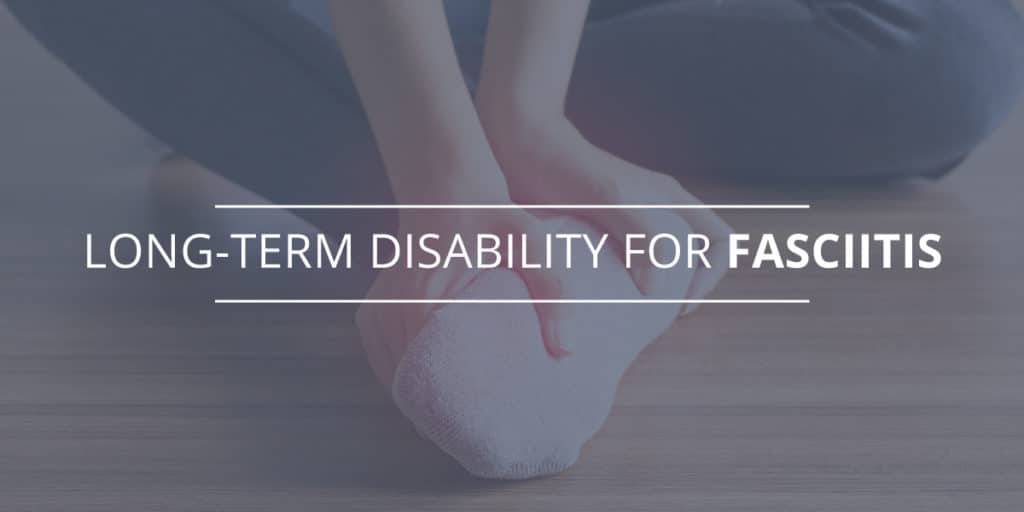
Can You Get Disability Benefits for Fasciitis?
Yes, there are options to receive disability benefits for fasciitis. Our bodies are both incredibly complex and resilient. But when something goes wrong in our bodies, it can cause significant pain — and a whole host of other symptoms.
Take fasciitis, for example. Fascia extends through every part of our body, providing structure to our bones, blood vessels, and nerves. When facia becomes inflamed due to damage, wear and tear, or injury, it can make it exceptionally difficult to use the affected body part due to pain.
If you have been diagnosed with fasciitis, you may find it difficult — or even impossible — to work. A Cherry Hill disability benefits attorney can work with you to help you file a claim for long-term disability benefits.
Table of Contents
What Is Fasciitis?
Fasciitis is an inflammation of the fascia. So what is fascia? It is a type of connective tissue that encases every blood vessel, bone, and nerve fiber in your body, holding it in place. The fascia provides internal structure to your body.
Fascia has nerves throughout that make it incredibly sensitive. It is made up of multiple layers with liquid in between each layer, designed to stretch as you move.
Although many of the fasciae in your body may become inflamed, one of the most common forms of fasciitis is plantar fasciitis. This occurs when the thick band of tissue that stretches across the bottom of your foot, connecting your heel bone to your toes, becomes inflamed. This thick band is known as the plantar fascia.
Plantar fasciitis causes a stabbing pain in the bottom of the foot, near the heel. The pain is typically worse in the morning, with the first few steps that you take. Pain may also occur after long periods of standing or after getting up from sitting.
Causes of Fasciitis
Plantar fasciitis happens after too much tension and stress on the plantar fascia causes small tears in the fascia. This may be caused by:
- Age
- Certain types of exercise
- Foot mechanics
- Obesity
- Jobs that require a lot of standing on hard surfaces
Diagnosing Fasciitis
This condition is diagnosed based on a review of your medical history and symptoms, as well as a physical examination. Anti-inflammatory medications, physical therapy, splints, and orthotics may help to relieve the symptoms. Steroid injections, shock wave therapy, ultrasonic tissue repair, and surgery may be necessary if conservative measures do not result in pain relief. If plantar fasciitis is not treated, it may result in chronic heel pain that can prevent you from engaging in activities.
Importantly, while plantar fasciitis is one of the most well-known types of fasciitis, it can impact other areas of the body. The symptoms, diagnosis, and treatment will vary based on which fascia is impacted.
Qualifying for Long-Term Disability for Fasciitis
Long-term disability (LTD) insurance offers monthly payments (usually between 50 and 60% of your salary) if you are unable to work due to a disability. There is usually a waiting period of anywhere from 180 days to 6 months before you can file a claim for LTD benefits. If your benefits are approved, they may be paid for anywhere from 2 years to your retirement.
Requirements to Apply for Benefits
When you apply for LTD benefits, you will be required to submit documentation to prove that you have an objective medical diagnosis of fasciitis and that your condition has made you unable to work. Demonstrating that your specific symptoms or side effects from fasciitis leave you unable to work is critical to qualifying for benefits. You must be able to directly link your symptoms to your condition.
For example, if you are a nurse, you likely spend the bulk of each shift standing and walking on hard surfaces. Because standing for an extended period of time can cause pain when you have plantar fasciitis, you may not be able to perform the essential functions of your job until your condition has improved. In this way, you can show a nexus between one of your symptoms — pain when standing and walking — and your inability to work, because your job requires you to be able to stand and walk for 8 hours or longer.
Denied Claims
Like all insurance companies, insurers that offer LTD policies maximize their profits by minimizing claims. Insurance companies use a variety of tactics to deny claims, such as claiming that you had a pre-existing condition, that you didn’t submit enough documentation to support your claim, or even that you are faking or exaggerating your symptoms. In the last case, the insurance company may use surveillance to argue that you are not truly disabled or unable to work.
If your insurance company has denied your claim for LTD benefits for fasciitis, you have options. First, you will likely need to file an appeal with your insurer. Second, if the initial appeal is denied, then you may choose to file a lawsuit against the company in federal or state court. A disability attorney can assist you with every part of this process.
Suffering from Fasciitis? Let Us Help.
If you have been diagnosed with any type of fasciitis — whether it is plantar fasciitis or another kind — then you know firsthand how debilitating this condition can be. Fascia is such an important part of our body. When your fascia is inflamed, it can cause an incredible amount of pain and make it difficult for you to perform simple tasks.
Bross & Frankel represents clients throughout New Jersey and Pennsylvania who are unable to work due to a disability. We have more than 100 years of combined experience and will put our knowledge to work for you. To learn more or to schedule a free disability claim review, contact our office today at (856) 795-8880 or reach out online.